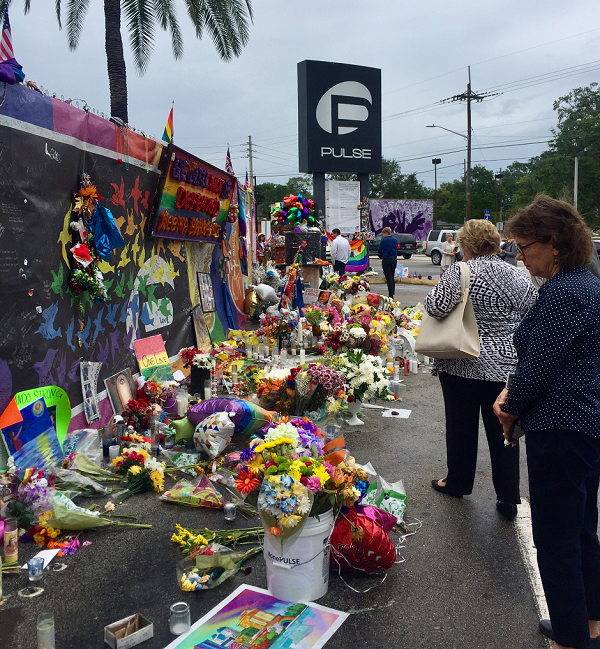Blog
What Philanthropy and Community Learned in the Wake of the Pulse Nightclub Shooting

This June marked the anniversary of a day that holds many titles:
-
-
- the deadliest mass shooting by a single shooter in the United States
- the deadliest incidence of violence against the LGBTQ community in the United States
- the deadliest terror attack within our country since September 11th
-
On June 12, 2016, Pulse, a gay nightclub in Orlando, Florida, was hosting “Latin Night” when a shooter entered and ultimately killed 49 people. At Orlando Strong Funders Symposium: One Year Later, national and local philanthropic leaders gathered in the city to share lessons learned from the response to the Pulse shooting tragedy. I attended the two-day symposium, held June 14-15, and came away with many lessons about the power of a community coming together to stand in the face of hate, as well as what happens when different philanthropies are challenged to move swiftly during a crisis.
The symposium’s first day focused on how various service sectors united to respond to unspeakable tragedy within the first days, weeks, and months following the massacre. The breadth and depth of the panels displayed just how many people came together quickly to make change. Doctors and hospital staff, for example, discussed the importance of having emergency plans and enacting drills. From hospitals to fire departments, lines of communication, which didn’t exist before the shooting, emerged and became crucial to recovery efforts.
Immediately after the shooting, philanthropies united to take action. The Ford Foundation, Open Society Foundations, The W.K. Kellogg Foundation, Arcus Foundation, Robert Wood Johnson Foundation, The Executives’ Alliance to Expand Opportunities for Boys and Men of Color, and Our Fund Foundation joined together as contributing partners to the Contigo Fund. The Contigo Fund is “an effort to strengthen and network existing agencies and to identify and support grassroots efforts that advance Latinx and LGBTQ causes and the intersection of these two communities.”
Normally, things don’t happen that fast in philanthropy, but in this case, the response was rapid.
Orlando’s economy thrives off tourism, and I was proud to see the tourism industry and theme parks step up right away. NBC Universal donated $1 million to the OneOrlando Fund, which was set up to aid the victims of the attack. That contribution then sparked a $1 million donation from The Walt Disney Co., as well as a dollar-for-dollar donation match from the company for its employees’ donations.
The City of Orlando also deserves recognition for how it handled the tragedy. It responded by embracing its native children. The outpouring of love and support was essential to begin the healing process. Today, Orlando is clad with rainbow flags and lights, made by the city and local businesses, to honor the victims and survivors. The city has taken steps also to identify the right leaders to build community supports. Felipe Sousa-Rodriquez, an LGBTQ-rights advocate who moved to Florida from Brazil when he was 14, was hired as the city’s administrator for the Orlando United Assistance Center following the crisis. The center aims to help Pulse survivors and the families of those killed.
The Orlando Strong symposium also hosted speakers from varying faiths to showcase the interfaith support around the city. Two members of the Muslim Women’s Organization kicked off the symposium with a welcome message, and clergy members presided over a visit to the site of the shooting. It was a beautiful touch to show that people of faith supported the LGBTQ community. This tragedy was meant to tear us apart but it did the opposite.
The second day of the symposium focused on “models for collaborative philanthropy and looking into the future.” With a year to reflect, this was our chance to share what we learned from the immediate responses of the attack, but also to take stock of the healing and the philanthropic collaboration that had taken place. It was also an opportunity to reflect on how we could have been better should another tragedy of this magnitude bring us together again.
Philanthropy should use the momentum achieved during the Pulse aftermath to keep doing good and to support the communities that were most affected. After the attack, existing issues within the underserved Latinx communities in Orlando and throughout Florida came to light. The Latinx community is growing in Florida—from migrant workers to Puerto Ricans fleeing economic hardship—and the supports must continue. With aid from local philanthropy like the Contigo Fund, these communities can continue to receive services and resources they need.
Like for many Americans, the Pulse shooting hit close to home for me. I am an Orlando native who identifies both as gay and as Latino. It could have been me. In the aftermath of a violent attack aimed at LGBTQ and Latinx Orlando community members, one thing is certain: Orlando is united and strong. Moving forward, philanthropy must continue to collaborate to serve the communities that came under attack at the Pulse shooting, and not just in moments of crisis, but every day.
Rafael Torres is a program associate at the Schott Foundation.


